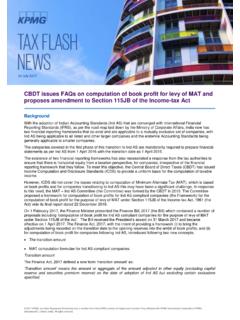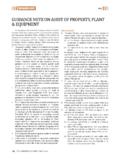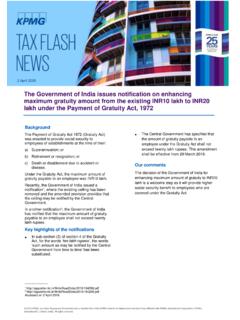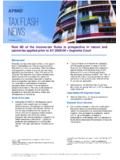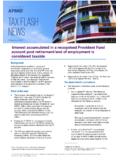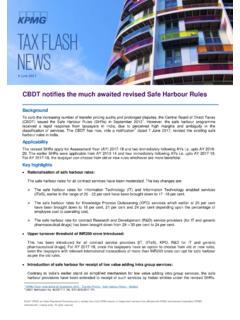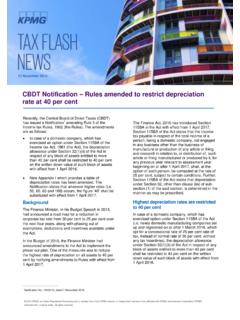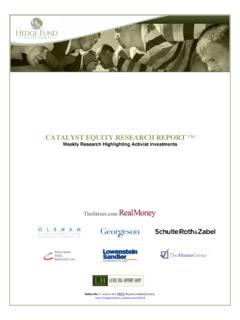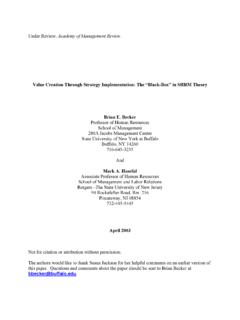Transcription of ) of the Income-tax Act Supreme Court - KPMG
1 20 April 2017. Sale of business on a 'going concern' basis is a 'slump sale'. and not a sale of depreciable asset under Section 50(2) of the Income-tax Act Supreme Court Background Recently, the Supreme Court of India in the case of 1. The taxpayer filed their income tax return for the Equinox Solution Pvt. Ltd. (the taxpayer) while Assessment Year 1991-1992. In the return of dealing with a case prior to the introduction of slump income, the taxpayer claimed deduction under 2. sale provisions held that sale of entire running 4. Section 48(2) of the Act as it stood then by business on 'going concern' basis is a slump sale. It treating the sale to be in the nature of slump sale'. is not treated as a sale of depreciable asset since 3 of the going concern being in the nature of long- Section 50(2) of the Income-tax Act, 1961 (the Act). term capital gain in the hands of the taxpayer. applies to a case where any block of assets are transferred by the taxpayer.
2 Where the entire running business with assets and liabilities is sold The Assessing Officer (AO) did not accept the by the taxpayer in one go, it cannot be treated as contention of the taxpayer in claiming the short-term capital asset'. The provisions of Section deduction. The AO held that the case of the 50(2) of the Act would apply to a case where the taxpayer was covered under Section 50(2) of the taxpayer transfers one or more block of assets, Act because it was in the nature of short-term which he was using running of his business. capital gain as specified in Section 50(2) of the Act However, in this case, the taxpayer sold the entire and hence did not fall under Section 48(2) of the business as a running concern. Act as claimed by the taxpayer. Accordingly, the AO reworked the claim of the deduction treating Facts of the case the same to be falling under Section 50(2) of the Act and framed the assessment order. The taxpayer was engaged in the business of manufacturing sheet metal components out of CRPA & OP sheds at Ahmadabad.
3 On 31 The Commissioner of Income-tax Appeals [CIT(A)]. December 1990, the taxpayer sold their entire allowed the taxpayer's appeal in so far as it related running business in one go with all its assets to the issue of deduction. Since the taxpayer has and liabilities on 31 December 1990. sold their entire running business in one go with its assets and liabilities at a slump price, provisions of _____. Section 50(2) of the Act could not be applied to 1. CIT v. Equinox Solution Pvt. Ltd. (Civil Appeal No. 4399 OF 2007) such sale. The CIT(A) held that it was not a case 2. Section 50B of the Act introduced by the Finance Act, 1999 with effect of sale of any individual or one block asset which from 1 April 2000 Assessment Year 2000-01 may attract the provisions of Section 50(2) of the 3. Special provision for computation of capital gains in case of depreciable asset - Where any block of assets ceases to exist as such, Act. He held that the undertaking is a capital asset for the reason that all the assets in that block are transferred during the previous year, the cost of acquisition of the block of assets shall be the _____.
4 Written down value of the block of assets at the beginning of the previous year, as increased by the actual cost of any asset falling within that block 4. This section has been amended by the Finance Act 1992 with effect from 1. of assets, acquired by the taxpayer during the previous year and the April 1993 This case was prior to 1992. income received or accruing as a result of such transfer or transfers shall be deemed to be the capital gains arising from the transfer of short-term capital assets. 2017 KPMG, an Indian Registered Partnership and a member firm of the KPMG network of independent member firms affiliated with KPMG International Cooperative ( KPMG. International ), a Swiss entity. All rights reserved. owned by the taxpayer for a period of six years. question in detail on somewhat similar facts Such asset is in the nature of the long-term and had taken a similar view. The tax capital asset and the same having been sold in department was not able to cite any decision one go as a running concerned, it cannot be taking a contrary view nor was he able to termed a short-term capital gain' so as to attract point out any error in the decisions cited by the provisions of Section 50(2) of the Act.
5 The taxpayer. Accordingly, the tax Accordingly, the CIT(A) allowed the taxpayer to department's appeal was dismissed. claim the deduction. Our comments The Tribunal concurred with the reasoning, and This decision deals with a case of slump sale the conclusion arrived at by the CIT(A). prior to the introduction of provisions of Section Subsequently, the High Court also dismissed 50B of the Act. The taxability of slump sale the tax department's appeal. transactions has been a matter of debate before the courts. Supreme Court 's ruling Prior to the introduction of slump sale provisions, No fault can be found in the reasoning, and the courts have held that slump sale is a sale of conclusion arrived at by the CIT(A). In our view business on a going concern basis where the the CIT(A)'s order was rightly upheld by the lump sum price cannot be attributed to individual Tribunal and then by the High Court calling no assets or liabilities. In the case of Artex interference by the Supreme Court in this 6.
6 Manufacturing Co. , the Supreme Court observed appeal. that the sale of the business on a going concern basis for a lump sum consideration as an The present case does not fall within the four itemised sale on the ground that the slump price corners of Section 50(2) of the Act. Section was determined by the valuer on the basis of 50(2) of the Act applies to a case where any itemised assets. However, in the case of Electric block of assets are transferred by the taxpayer. 7. Control Gear Mfg. Co. it was held that the sale Where the entire running business with assets of the business on a going concern was regarded and liabilities is sold by the taxpayer in one go, as a slump sale since in that case, there was such sale cannot be considered as a short-term nothing to show that the slump price is capital asset'. attributable to any individual asset. The provisions of Section 50(2) of the Act would Further, the Supreme Court in the case of PNB.
7 8. apply to a case where the taxpayer transfers Finance Ltd. after considering the provisions of one or more block of assets, which he was Sections 41(2), 45 and 50B of the Act held that using in running of his business. This is not the gain from slump sale transactions is neither case here because in this case, the taxpayer taxable as business income under Section 41(2). sold the entire business as a running concern. nor as capital gains under Section 45 of the Act. The Supreme Court held that to attract Section As rightly noticed by the CIT(A) that the entire 41(2), the subject matter should be depreciable running business with all assets and liabilities assets and the consideration received should be having been sold in one go by the taxpayer, it capable of allocation between various assets. In was a slump sale of a long-term capital asset'. the case of a slump sale, there is an undertaking It was, therefore, required to be taxed which gets transferred (including depreciable and accordingly.)
8 Non-depreciable assets), and it is not possible to allocate slump price to depreciable assets, and The Supreme Court finds support with various therefore, the same cannot be taxed under 5. decisions . In the case of Premier Automobiles Section 41(2) of the Act. Ltd., the Bombay High Court examined this _____. 6. CIT v. Artex Manufacturing Co. [1997] 227 ITR 260 (SC). 7. _____ CIT v. Electric Control Gear Mfg. Co. [1997] 227 ITR 278 (SC). 8. PNB Finance Ltd. v. CIT [2008] 307 ITR 75 (SC). 5. CIT v. Artex Manufacturing Co. [1997] 227 ITR 260 (SC), Premier Automobiles Ltd. v. ITO [2003] 264 ITR 193 (Bom). 2017 KPMG, an Indian Registered Partnership and a member firm of the KPMG network of independent member firms affiliated with KPMG International Cooperative ( KPMG. International ), a Swiss entity. All rights reserved. The Supreme Court while dealing with a case prior to the introduction of Section 50B of the Act held that sale of the entire business on a 'going concern'.
9 Basis is a slump sale, and it is not treated as the sale of a depreciable asset under Section 50(2) of the Act. 2017 KPMG, an Indian Registered Partnership and a member firm of the KPMG network of independent member firms affiliated with KPMG International Cooperative ( KPMG. International ), a Swiss entity. All rights reserved. Ahmedabad Delhi Mumbai Commerce House V, 9th Floor, Building , 8th Floor Lodha Excelus, Apollo Mills 902 & 903, Near Vodafone House, DLF Cyber City, Phase II N. M. Joshi Marg Corporate Road, Gurgaon, Haryana 122 002 Mahalaxmi, Mumbai 400 011. Prahlad Nagar, Tel: +91 124 307 4000 Tel: +91 22 3989 6000. Ahmedabad 380 051 Fax: +91 124 254 9101 Fax: +91 22 3983 6000. Tel: +91 79 4040 2200. Fax: +91 79 4040 2244 Hyderabad Noida 8-2-618/2 6th Floor, Tower A. Bengaluru Reliance Humsafar, 4th Floor Advant Navis Business Park Maruthi Info-Tech Centre Road , Banjara Hills Plot No. 07, Sector 142. 11-12/1, Inner Ring Road Hyderabad 500 034 Noida Express Way Koramangala, Bangalore 560 071 Tel: +91 40 3046 5000 Noida 201 305.
10 Tel: +91 80 3980 6000 Fax: +91 40 3046 5299 Tel: +91 0120 386 8000. Fax: +91 80 3980 6999 Fax: +91 0120 386 8999. Kochi Chandigarh Syama Business Center Pune SCO 22-23 (Ist Floor) 3rd Floor, NH By Pass Road, 703, Godrej Castlemaine Sector 8C, Madhya Marg Vytilla, Kochi 682019 Bund Garden Chandigarh 160 009 Tel: +91 484 302 7000 Pune 411 001. Tel: +91 172 393 5777/781 Fax: +91 484 302 7001 Tel: +91 20 3050 4000. Fax: +91 172 393 5780 Fax: +91 20 3050 4010. Kolkata Chennai Unit No. 603 604, Vadodara , Mahatma Gandhi Road 6th Floor, Tower 1, iPlex India Private Limited, Nungambakkam Godrej Waterside, 1st floor office space, No. 1004, Chennai 600 034 Sector V, Salt Lake, Vadodara Hyper, Dr. V S Marg Tel: +91 44 3914 5000 Kolkata 700 091 Bund Garden Fax: +91 44 3914 5999 Tel: +91 33 44034000 Vadodara 390 007. Fax: +91 33 44034199 Tel: +91 0265 235 1085/232 2607/232 2672. The information contained herein is of a general nature and is not intended to address the circumstances of any particular individual or entity.

